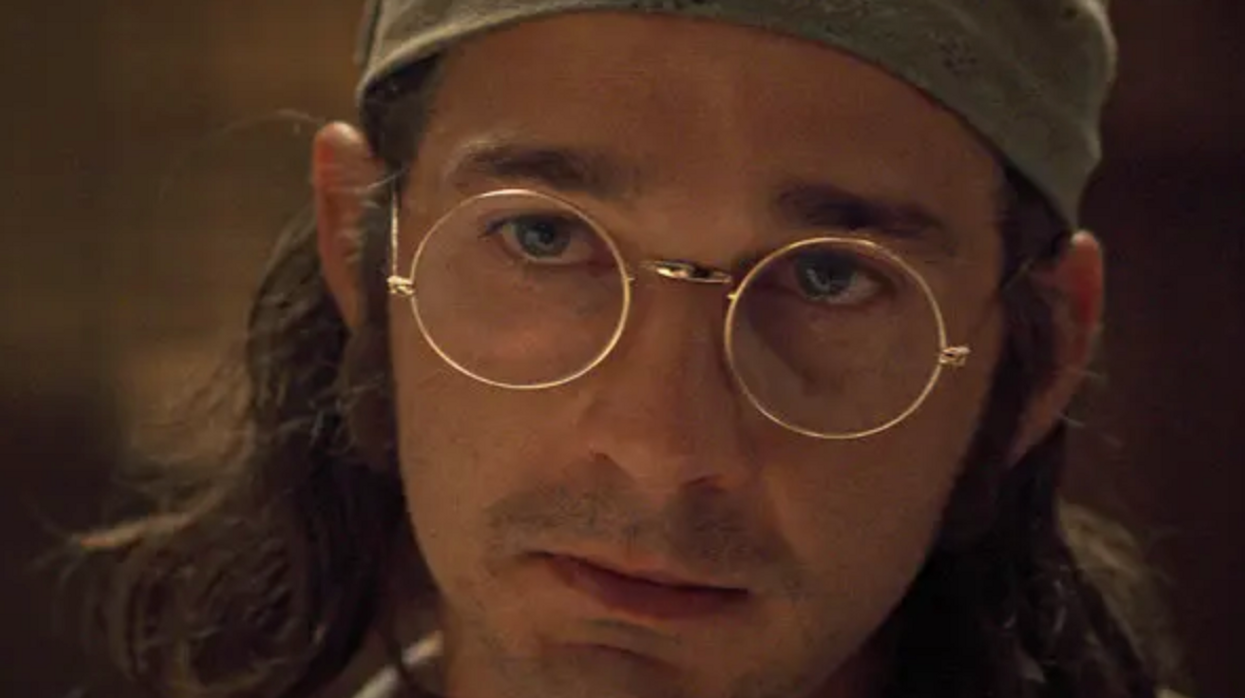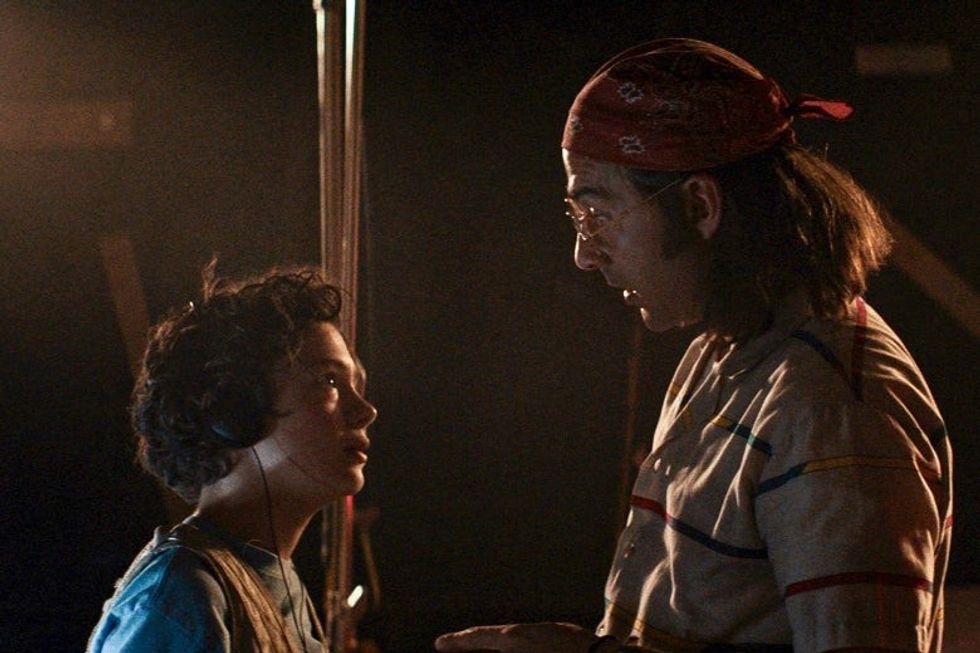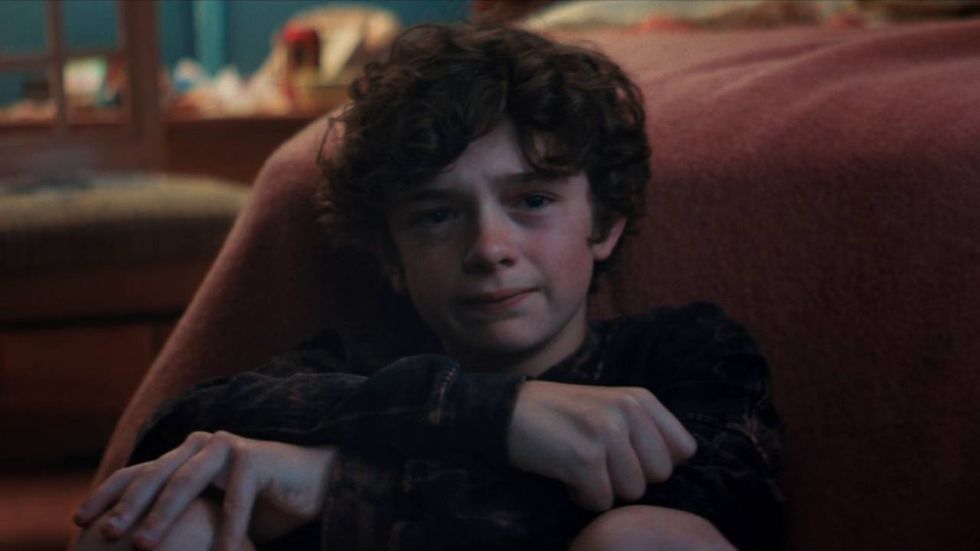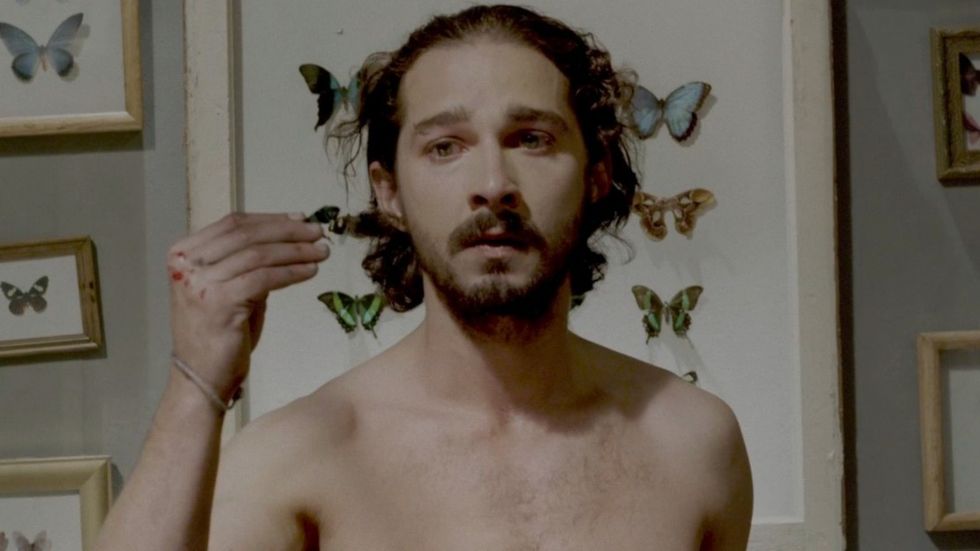'Honey Boy' Director Alma Har'el Explains How to Jumpstart Your Directing Career
Alma Har'el's Honey Boy is a beautifully complex story based on Shia LaBeouf's experience as a child actor.

Shia LaBeouf is as complex a public figure as they come. The 33-year-old celebrity, whose career jumpstarted as a child actor on Even Stevens and went on to span a host of Michael Bay movies and other Hollywood fare, has been at the center of many scandals over the years, including drunk driving accidents and arrests for belligerent behavior and possession of drugs.
At one point, it seemed as if LaBeouf's trail of infamy might eclipse his acting career altogether. Then, he was court-ordered to attend rehab. While seeking treatment for PTSD, LaBeouf wrote the script for Honey Boy, a semi-autobiographical account of his traumatic childhood. The Amazon Studios film heralds a new chapter for LaBeouf. It is evidence of serious, clear-eyed self-reflection—the kind that can only be produced by an artist who has stared his demons in the face.
"Natasha [Braier, the DP] created very complicated setups of lighting that she could operate in real-time."
Alma Har'el, a music video, commercial, and documentary director, makes her narrative feature debut with Honey Boy, which bears many of the evocative visuals and free-flowing story elements of her previous work. The fact that Har'el could relate to the project emotionally—both she and LaBeouf were the children of alcoholic clowns—is apparent in the sensitive, nuanced treatment of what might otherwise have been a black-and-white tale of child abuse.
In the film, LaBeouf stars as his father, James, an on-again-off-again alcoholic and convicted sex offender. Otis (Noah Jupe), the character LaBeouf based on himself as a 12-year-old, employs James as his chaperone. Every day, James drives Otis from the shoddy motel where they live to the studio where Otis is employed as a child actor. The dynamic between James and his son is fraught with jealousy and resentment; often, James will emotionally or physically abuse Otis in an apparent effort to reclaim some vestige of power as an authority figure. Honey Boy cuts back and forth between scenes from Otis's childhood to his life as a young adult (then played by Lucas Hedges), as he attempts to grapple with his dysfunctional upbringing and concomitant emotional instability.
No Film School sat down with Har'el to discuss the merits of getting your start as a music video director, the most important thing to consider when attempting to finance an indie project, lighting a set for improvisation-friendly actors, and more.
Honey Boy premiered in the dramatic competition at Sundance 2019, where Har’el won the Special Jury Award for Vision and Craft; now it's in theaters nationwide.
No Film School: Why team up with Shia on this film? What was compelling about his life story to you?
Alma Har'el: I've known Shia for many years. He reached out to me for the first time in 2012 after I made my first documentary Bombay Beach. We made a music video together for Sigur Rós. He also executive-produced my second film.
Personally, over the years, I've seen Shia do these really big acts of support for artists and art in general. And then, from far away, I could see all of his public altercations and his experiences with alcoholism [in the media].
He had a personal life that nobody knew about. A lot of people grew up on Even Stevens and had no idea what life he was living at home. There was something about this reality of being very performative to the world, but having a whole different life at home... that is a story that I had to tell.
Eventually, Shia was court-ordered to go to rehab and a mental health institution. He was diagnosed with severe PTSD, and as a result of that, he started exposure therapy. As part of that therapy, he had to write down his memories of that period in his life when he was on Even Stevens. He turned it into a script and sent me those pages. When I read it, I just felt like I was inside that motel room that he grew up in. He had to hire his father, basically, to take care of him—his father was his chaperone, and he paid him.
"It's very confusing casting a movie about somebody when they're in the movie, too."
NFS: The actors who play young Shia and older Shia were both very strong choices. I can imagine the film was difficult to cast, though, because Shia himself was playing his father.
Har'el: Yes. It's very confusing casting a movie about somebody when they're in the movie, too.
We had a really wonderful casting director named Chelsea Bloch, and we worked together to reach out to a lot of actors that felt initially like they could carry this essence that Shia has as an actor and as a man. The people that we were [auditioning] looked and seemed too much like Shia. It felt like we would end up with one of those wacky fun-house carnival mirrors.
When I met Lucas Hedges, it kind of all became clear to me what had to happen. He and Noah Jupe are both some of the most gifted actors today and they both had the ability to tap into that love for acting and truth. The ideas that they had about how to play this character were so much more interesting than just casting somebody who looks exactly like Shia or carries the same energy.
NFS: They had a certain congruity with their performances.
Har'el: I think that they're both extremely charismatic. Also, their expressions of masculinity, I think, are a lot more ethereal and free from the expectations of masculinity that were put on Shia growing up.

NFS: You are a very visual director. This film was beautiful and also emotionally evocative visually. How did you conceive of how you would tell the story aesthetically with the cinematography?
Har'el: Natasha Braier, the DP, is one of the best cinematographers in the world.
It was really important for me to find a woman cinematographer to tell this story with. We live in a time where we just saw the first woman cinematographer to ever be nominated for the Oscar: Rachel Morrison. I think that we have seen enough ideas about masculinity through the eyes of men; I wanted to see it through the eyes of women.
Natasha gets down to every detail of what you're trying to do—not from a technical perspective, but from really understanding the psychology and the goal stylistically, and how the two work together. She understands how the intention of the film and the intention of each scene are going to manifest visually. So we went scene by scene and really discussed what each scene [in Honey Boy] had to feel like. Natasha also watched my films and understood how I wanted to shoot things. I prefer handheld; it has a sense of reality and intimacy that allows the actors to improvise and move around the room.
"I prefer handheld; it has a sense of reality and intimacy that allows the actors to improvise and move around the room."
Natasha created very complicated setups of lighting that she could basically operate in real-time. She would shift them so we could be free to move inside the motel room anywhere we wanted, instead of lighting it in 360 and making it a theatrical stage with very flat light. She had about 10 setups that she was actually moving between in real-time while the actors were performing in the room freely. That way, they weren't tied to marks on the floor. It was very important to me, to create that space for them.
It was an amazing thing to do, to make that happen in such a tight schedule. We filmed the whole film in 21 days.
Natasha is also capable of things that are extremely iconic and visual. When I wanted to bring to life the more cinematic scenes in the film—for example, the opening shot, which is a huge Michael Bay shot—we did that in one take. That's possible when you have a crew like the one we had, where every person is top of the game and does everything they needed to do in the best way possible. From production design and costumes to special effects and visual effects and camera department, every person that worked on this film was giving it everything in order to do what we did in such a short time.
NFS: How did you navigate having your vision for the film and retaining creative control, but also honoring the representation of Shia's childhood?
Har'el: Shia was very generous about all of that and trusted me with everything. I think that the thing that he was most concerned about was bringing his father's character to life and representing him in a way that felt genuine to him. He wanted to do the best he could.

Har'el: It was very important to me that everything we did felt real—every prop in the room had to be something that we used. Nothing was there for decoration. The socioeconomic aspects of the film were also really important for me because I wanted to capture the textures of the life that he lived.
Shia did give me feedback constantly when I asked for it. At the same time, though, he never came to set when he wasn't acting. He gave Lucas and Noah and me complete freedom to tell the story from our own perspective and comment on [his performance] too. In that regard, it was a really good collaboration. That was possible because we built enough trust prior to making the movie. It didn't happen overnight!
"I couldn't finance my first film, so I ended up buying a camera at Best Buy and shooting my own documentary."
NFS: You got your start in music videos. Aspiring filmmakers often wonder whether that's still a viable career path. Based on your experience, what would you say about the path that you took?
Har'el: I started with photography and video art, and making video performances with bands, and then music videos and documentaries, and then commercials, and then features. I've done everything, and I feel like everything that I've learned has been useful to me. I have no fear when I step on a set. Of course, it's a daunting task, but I feel like I have a lot of different skills that always come into play in some way or another.
Where you start out really depends on how much you want to find and explore your voice before you make a bigger piece. To me, the most important thing was to find my voice, and I did that in the years that I did music videos. My challenge was that at that point, women were not given the same opportunities as men. I wasn't getting the bigger budgets that I wanted. I couldn't finance my film, so I ended up buying a camera at Best Buy and shooting my own documentary as my directorial debut. It was only when that film [Bombay Beach] won the Tribeca Film Festival that I could start getting commercials and financeable projects.
For somebody who's starting out today, there's a bigger community that supports you in breaking in. I myself run a nonprofit that's called Free the Work. If you go on it and register as an emerging filmmaker, you can become part of a community and get a lot of opportunities for hire but also have mentorship.

Har'el: I think that music videos are still a great way to start, but the problem is that the golden age of music videos ended before I even started. It really depends on what kind of filmmaker you want to be. In a way, writing your own scripts and your own materials is actually the fastest way to become a filmmaker. But if you haven't done any filmmaking, then you might end up experimenting on your own first film. That is not a bad thing, but it's just a different path.
I think every person has their own path. I don't like telling people what, when, and where to start. It really depends if they want to start in a more visual way or start more from scriptwriting, or if they really need money to support themselves. A lot of people really need to make good money in order to sustain themselves in Los Angeles or New York.
"Know your rights. Make sure you don't get into situations that take advantage of you, or don't teach you anything and keep you subordinated."
The one thing that I would say is that it's really important to know your rights. Make sure you don't get into situations that take advantage of you or situations that don't teach you anything and keep you subordinated. Find a community that answers your questions when you are in a position to move forward and you need help making decisions.
NFS: You said you couldn't finance your first film, but after its festival success, you had more opportunities. When you're in the room with people that might be able to fund your film, what are some skills that are important to have?
Har'el: I think it's important to be able to speak about your idea with clarity and passion. Also, to read the room and know who you're talking to and what they care about. You need to find real allies. The truth is that you have to be on a path that leads you to your people. And if you're not with your people, you can talk all day, but they don't hear you. They don't understand your language. They don't know who you are and what you're about, because they're not your people.
So, how do you get on a path that leads you to synchronicity? How do find those people who can appreciate your work and see your vision? That's something that every person, again, has to figure out for themselves. It comes from knowing who you are and finding your voice.
NFS: How do you know when you've found your voice?
Har'el: I think when you start meeting people who respond to you. When they speak to you, you know they understand you, and you understand them. Then you know you've managed to communicate something that can't be said in words.











